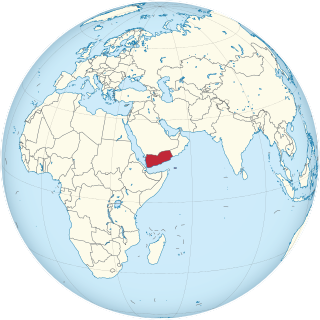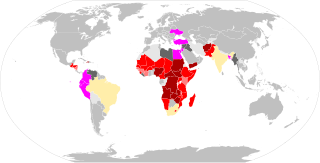
A cordon sanitaire is the restriction of movement of people into or out of a defined geographic area, such as a community, region, or country. The term originally denoted a barrier used to stop the spread of infectious diseases. The term is also often used metaphorically, in English, to refer to attempts to prevent the spread of an ideology deemed unwanted or dangerous, such as the containment policy adopted by George F. Kennan against the Soviet Union.

Disease surveillance is an epidemiological practice by which the spread of disease is monitored in order to establish patterns of progression. The main role of disease surveillance is to predict, observe, and minimize the harm caused by outbreak, epidemic, and pandemic situations, as well as increase knowledge about which factors contribute to such circumstances. A key part of modern disease surveillance is the practice of disease case reporting.

Ambassador Josette Sheeran is a decorated diplomat, humanitarian, entrepreneur and technology leader.
The International Health Regulations (IHR), first adopted by the World Health Assembly in 1969 and last revised in 2005, are legally binding rules that only apply to the WHO that is an instrument that aims for international collaboration "to prevent, protect against, control, and provide a public health response to the international spread of disease in ways that are commensurate with and restricted to public health risks and that avoid unnecessary interference with international traffic and trade". The IHR is the only international legal treaty with the responsibility of empowering the World Health Organization (WHO) to act as the main global surveillance system.
International Medical Corps is a global, nonprofit, humanitarian aid organization that provides emergency medical services, healthcare training and capacity building to those affected by disaster, disease or conflict." It seeks to strengthen medical services and infrastructure in the aftermath of crises."

Tom Arnold is an Irish agricultural economist and public policy advisor who has worked for the European Commission, the Irish Department of Agriculture and Food and Concern Worldwide. He has served on governmental and non-governmental bodies at Irish, European and international level, with a particular focus on sustainable food systems and nutrition.
Anthony Banbury was appointed the President and Chief Executive Officer of the International Foundation for Electoral Systems (IFES) in 2018. He served as United Nations Assistant Secretary-General for Field Support until 5 February 2016. He resigned from this position, stating that the UN is in dire need of reform. Drawing on more than 20 years of experience with the UN, he criticized its sclerotic personnel system, a lack of accountability, insufficient impact and the UN's inability to deal with transgressions by its own staff.

The 2010s Haiti cholera outbreak was the first modern large-scale outbreak of cholera—a disease once considered beaten back largely due to the invention of modern sanitation. The disease was reintroduced to Haiti in October 2010, not long after the disastrous earthquake earlier that year, and since then cholera has spread across the country and become endemic, causing high levels of both morbidity and mortality. Nearly 800,000 Haitians have been infected by cholera, and more than 9,000 have died, according to the United Nations (UN). Cholera transmission in Haiti today is largely a function of eradication efforts including WASH, education, oral vaccination, and climate variability. Early efforts were made to cover up the source of the epidemic, but thanks largely to the investigations of journalist Jonathan M. Katz and epidemiologist Renaud Piarroux, it is widely believed to be the result of contamination by infected United Nations peacekeepers deployed from Nepal. In terms of total infections, the outbreak has since been surpassed by the war-fueled 2016–2021 Yemen cholera outbreak, although the Haiti outbreak is still one of the most deadly modern outbreaks. After a three-year hiatus, new cholera cases reappeared in October 2022.

Seven cholera pandemics have occurred in the past 200 years, with the first pandemic originating in India in 1817. The seventh cholera pandemic is officially a current pandemic and has been ongoing since 1961, according to a World Health Organization factsheet in March 2022. Additionally, there have been many documented major local cholera outbreaks, such as a 1991–1994 outbreak in South America and, more recently, the 2016–2021 Yemen cholera outbreak.

Tedros Adhanom Ghebreyesus is an Ethiopian public health official, researcher, diplomat, and the Director-General of the World Health Organization since 2017. He is the first African to become WHO Director-General, receiving an endorsement for the role by the African Union. Tedros played a role in the response to the Ebola virus epidemic, the COVID-19 pandemic, and the 2022–2023 mpox outbreak.

A public health emergency of international concern is a formal declaration by the World Health Organization (WHO) of "an extraordinary event which is determined to constitute a public health risk to other States through the international spread of disease and to potentially require a coordinated international response", formulated when a situation arises that is "serious, sudden, unusual, or unexpected", which "carries implications for public health beyond the affected state's national border" and "may require immediate international action". Under the 2005 International Health Regulations (IHR), states have a legal duty to respond promptly to a PHEIC. The declaration is publicized by an IHR Emergency Committee (EC) of international experts, which was developed following the 2002–2004 SARS outbreak.

Organizations from around the world responded to the West African Ebola virus epidemic. In July 2014, the World Health Organization (WHO) convened an emergency meeting with health ministers from eleven countries and announced collaboration on a strategy to co-ordinate technical support to combat the epidemic. In August, they declared the outbreak an international public health emergency and published a roadmap to guide and coordinate the international response to the outbreak, aiming to stop ongoing Ebola transmission worldwide within 6–9 months. In September, the United Nations Security Council declared the Ebola virus outbreak in the West Africa subregion a "threat to international peace and security" and unanimously adopted a resolution urging UN member states to provide more resources to fight the outbreak; the WHO stated that the cost for combating the epidemic will be a minimum of $1 billion.

An outbreak of cholera began in Yemen in October 2016. The outbreak peaked in 2017 with over 2,000 reported deaths in that year alone. In 2017 and 2019, war-torn Yemen accounted for 84% and 93% of all cholera cases in the world, with children constituting the majority of reported cases. As of November 2021, there have been more than 2.5 million cases reported, and more than 4,000 people have died in the Yemen cholera outbreak, which the United Nations deemed the worst humanitarian crisis in the world at that time. However, the outbreak has substantially decreased by 2021, with a successful vaccination program implemented and only 5,676 suspected cases with two deaths reported between January 1 and March 6 of 2021.

Jean-Jacques Muyembe is a Congolese microbiologist. He is the general director of the Democratic Republic of the Congo Institut National pour la Recherche Biomedicale (INRB). He was part of team at the Yambuku Catholic Mission Hospital that investigated the first Ebola outbreak, and was part of the effort that discovered Ebola as a new disease, although his exact role is still subject to controversy. In 2016, he led the research that designed, along with other researchers at the INRB and the National Institute of Health Vaccine Research Center in the US, one of the most promising treatment for Ebola, mAb114. The treatment was successfully tested during recent outbreaks in the DRC, on the express decision of the then DRC Minister of Health, Dr Oly Ilunga, despite advice against this from the World Health Organization.

Michael Joseph Ryan is an Irish epidemiologist and former trauma surgeon, specialising in infectious disease and public health. He is executive director of the World Health Organization's Health Emergencies Programme, leading the team responsible for the international containment and treatment of COVID-19. Ryan has held leadership positions and has worked on various outbreak response teams in the field to eradicate the spread of diseases including bacillary dysentery, cholera, Crimean–Congo hemorrhagic fever, Ebola, Marburg virus disease, measles, meningitis, relapsing fever, Rift Valley fever, SARS, and Shigellosis.
Sylvie Champaloux Briand is a French physician who is Director of the Pandemic and Epidemic Diseases Department at the World Health Organization. Briand led the Global Influenza Programme during the 2009 swine flu pandemic. During the COVID-19 pandemic, Briand launched the WHO Information Network for Epidemics which looked to counter the spread of COVID-19 misinformation.

During the COVID-19 pandemic, food insecurity intensified in many places. In the second quarter of 2020, there were multiple warnings of famine later in the year. In an early report, the Nongovernmental Organization (NGO) Oxfam-International talks about "economic devastation" while the lead-author of the UNU-WIDER report compared COVID-19 to a "poverty tsunami". Others talk about "complete destitution", "unprecedented crisis", "natural disaster", "threat of catastrophic global famine". The decision of the WHO on 11 March 2020, to qualify COVID as a pandemic, that is "an epidemic occurring worldwide, or over a very wide area, crossing international boundaries and usually affecting a large number of people" also contributed to building this global-scale disaster narrative.

The United Nations response to the COVID-19 pandemic has been led by its Secretary-General and can be divided into formal resolutions at the General Assembly and at the Security Council (UNSC), and operations via its specialized agencies and chiefly the World Health Organization in the initial stages, but involving more humanitarian-oriented agencies as the humanitarian impact became clearer, and then economic organizations, like the United Nations Conference on Trade and Development, the International Labour Organization, and the World Bank, as the socioeconomic implications worsened.
The following lists events that happened with or in collaboration with the United Nations and its agencies in the year 2021.

The 2022–2023 Uganda Ebola outbreak was an outbreak of the Sudan ebolavirus, which causes Ebola, from 20 September 2022 until 10 January 2023 in the Western and Central Regions of Uganda. Over 160 people were infected, including 77 people who died. It was Uganda's fifth outbreak with Sudan ebolavirus. The Ugandan Ministry of Health declared the outbreak on 20 September 2022. As of 25 October 2022, there were confirmed cases in the Mubende, Kyegegwa, Kassanda, Kagadi, Bunyanga, Kampala and Wakiso districts. As of 24 October 2022, there were a total of 90 confirmed or probable cases and 44 deaths. On 12 October, the first recorded death in the capital of Kampala occurred; 12 days later on 24 October, there had been a total of 14 infections in the capital in the last two days. On 11 January 2023 after 42 days without new cases the outbreak was declared over.

















